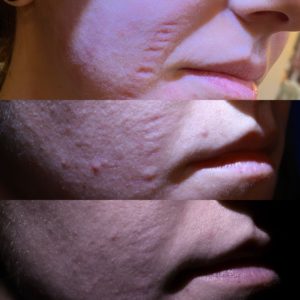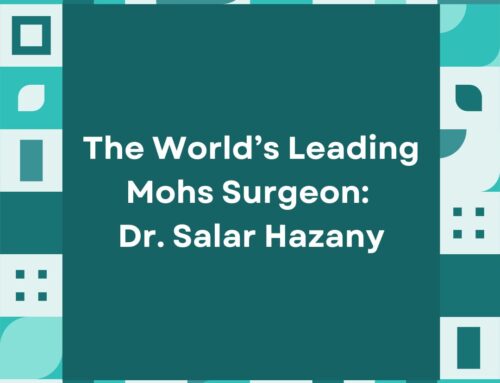As our country navigates the uncharted waters of the COVID-19 pandemic, healthcare workers and the general public are working together to ensure the highest level of safety for vulnerable community members. One necessary precaution to maintain well-being is wearing a mask to protect and prevent transmission of the novel coronavirus.
As people continue to follow governmental guidelines and recommendations, many are experiencing an increasingly prevalent problem called maskne (a play on words of “mask” and “acne,” meaning mask-induced acne). Everyday mask use makes this a common topic in the dermatology community.
The team here at Scar Healing Institute works closely with Dr. Salar Hazany’s private practice located in Beverly Hills, California. Dr. Hazany believes in beauty, healthy skin, and protecting our community! Let’s discuss why this phenomenon happens and what we can do to prevent maskne through awareness and proactive skin care.
The Science Behind Maskne
Maskne is a phenomenon where patients experience increases in acne breakouts, specifically in areas where a mask is worn: nose, mouth, and chin.

There are several reasons why maskne happens. One of these reasons is that masks are a physical barrier preventing outside air droplets from entering and keeping air droplets inside. In doing so, this causes a humid, moisture-rich environment for bacteria to grow because pores can get clogged from excess oil, sweat build-up, and dead skin cells.
There are two major conditions associated with maskne: acne mechanica and perioral dermatitis.
Before the pandemic, acne mechanica was ordinarily present in athletes, soldiers, or anyone who uses protective face equipment. The reason being is that this acne is developed by prolonged friction or rubbing on the skin and heat. The masks’ rubbing against the face also causes micro-tears on the skin, allowing undesirable bacteria, sweat, and dirt to grow.
This acne develops in pustular form as white or yellowish bumps of pus and fluid. They are typically present on the back, shoulders, or buttocks from bras and clothing, backpacks, and heavy bags, as well as chair friction.
The second is perioral dermatitis, present as a scaly or bumpy rash centered mainly around the mouth and philtrum (between the lips and the nose). This acne looks highly inflamed, causing it to appear red on the skin.
Even before the pandemic, the exact cause of perioral dermatitis was unknown. Many factors could contribute to it: bacterial or fungal infections, hormonal changes such as birth control pills, sunscreen use, rosacea (another serious skin condition), as well as non-prescribed corticosteroid medications and cream applications.
Questions, Considerations, and Tips Regarding Maskne
There are some important questions to ask yourself when practicing safe mask use to prevent maskne proactively.
1. Is your mask breathable, safe, and clean?
Your mask needs to be easily breathable, but also safe in that it covers your nose and mouth. Highly regarded researchers have displayed support for homemade cotton masks, which may be easily machine-washed. Many who use cotton masks have also remarked that they tend to be more breathable and more comfortable to wear.
Disposable masks should be frequently replaced, especially after prolonged use or after intensive activity (exercise or sweating). With that said, you should regularly clean reusable masks to remove residue from other skin appliances (sunscreen, makeup, creams, moisturizers, and more). When left unwashed, the mask constantly traps and reapplies an accumulation of bacteria to the face.
2. What are you applying to your face under the mask?
While makeup is a wonderful and beautiful art practiced by many patients, many dermatologists do not recommend applying makeup if possible when wearing a mask during these times. Many dermatologists have attributed simultaneous makeup and mask-wearing to acne as the extra oil from products can lead to clogged pores. If patients want to continue their makeup use, they should use non-comedogenic, oil-free, naturally water-based, and fragrance-free products.
3. Can I still practice my regular skincare routine with my everyday products?
While many find comfort in their 10-step skincare regimen, many dermatologists encourage patients to practice more straightforward skincare. Since masks create additional everyday problems that were not once present, such as irritation and micro-tears in the epidermis, a gentle moisturizer along with a soft cleanser is enough to maintain a good skincare routine.
Many dermatologists encourage patients to apply moisturizer on their skin before using a mask. This helps decrease the friction that occurs while also keeping the skin from dryness and irritation. A little bit goes a long way! Dermatologists recommend that you only apply a small layer of moisturizer to the skin.
Common Treatments for Maskne
There are many common over-the-counter medications and home remedies that Dr. Hazany recommends (see article Top Home Remedies and Treatments for Acne).
Products commonly used before the pandemic, such as facial washes, retinols, and creams, may or may not work well with masks depending on your skin’s sensitivity. Common ingredients in most of these remedies, such as benzoyl peroxide, salicylic acid, or glycolic acid and lactic acid, can help serve as affordable treatments to maskne.
However, it is important to use them with caution as some products are kinder to sensitive skin and less prone to inflammation or irritation than others. Dermatologists also advise against thick creams and advocate more for water-based, thin lotions or gels.
Reaching Out to a Professional
Remember that everyone’s skin is different, and the use of masks will also change each patient’s skin physiology. For example, products that once worked well for patients before may not have the same effect, or patients who did not have acne problems may begin experiencing them.
If you are experiencing maskne, your skin situation does not improve, or you would like to learn more about how to achieve healthy skin, seek help from a professional who cares about your well-being.
Dr. Salar Hazany, a board-certified, highly-skilled dermatologist at Scar Healing Institute will work with you to individually address your concerns and needs during this challenging time. He will be able to craft a solution and create a detailed treatment plan for resolving the maskne problem you are experiencing.
The team here at Scar Healing Institute practice continues to follow the necessary guidelines and precautions to keep our community and its members safe. Let’s all continue to do our part in wearing a mask to fight COVID-19 and practicing safe skincare steps to fight maskne!
Schedule an Appointment
Scar Healing Institute
Scar Healing Institute is committed to developing the most effective treatments for scarring. Our team of scar revision specialists are continually inventing the latest technologies and formulas to deliver the best results for our patients.




